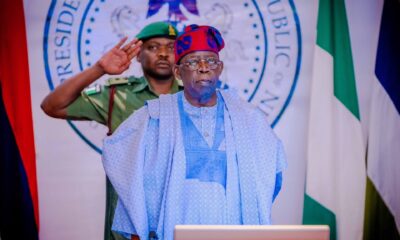Rivers
IIJ, Pride To NUJ –Dokubo
The Rivers State Chairman of the Nigeria Union of Journalists (NUJ), Mr. Opaka Dokubo, has described the International Institute of Journalism (IIJ) as a pride to the union in view of its critical role in the training of professional journalists in the country.
The NUJ boss made the remarks last Saturday at the 6th matriculation ceremony of the Port Harcourt centre of the institutes.
Excited Dokubo noted that the centre which was established in 1996 with the mandate to train those interested in journalism practice to have the prerequisite qualification had done well and justified its existence over the years.
Represented at the event by the Secretary of the State Council, Mr. Stanley Job Stanley, the NUJ boss said there was a time when recognition of certificates issued by the institute was a problem but expressed joy that, today, IIJ cerificates are recognized by institutions and relevant bodies across the nation, and commended management of the centre for providing improved training for students.
“The products are doing very well wherever they work and this is a clear indication of the strong commitment of the lecturers and centre management and I hope this would be sustained,” he said.
Mr. Dokubo urged the new intakes to take their studies seriously adding that, the union is waiting eagerly to receive them as members when they graduate and begin to practice.
In the address, the Director of IIJ, Dr Emman Shehu Usman said the Port Harcourt centre hasbecome one of the best in the training of journalists East of the Niger.
In his address presented by the Port Harcourt Centre Co-ordinator, Mr. Ibituru Pepple, the Director promised to consider appeals by students to reduce the new increscent in tuition fees.
He also said that the administration was committed towards providing Radio and Television Studies as well as Laboratories for better training of students.
Earlier, the Port Harcourt centre co-ordinator, Mr. Ibituru Pepple, had reassured the commitment of the centre in providing improved training for professionals in an ailing economy.
He remarked that the impressive performances of the products of the centre had marked it out as one of the best in sub-sahara Africa, and commended the leadership of NUJ in the State for its dependable support and collaboration, which he said, was instrumental to the success story of the centre.
Mr. Pepple, however, appealed formore support by the Rivers State Government, NGOs and public spirited individuals in view of the critical role of the media in the democratic setting of the country.
On the increased tuition fee as introduced by the institute, the co-ordinator, said it was aimed at meeting the economic reality of the nation, stressing that research was vital in the institute as a training cetnre.
He identified finance as the major challenge facing the centre, and appealed to authorities at the Headquarters for a five-year tax holiday to enable the Port Harcourt centre develop a permanent centre.
A total of 65 persons matriculate for the various programmes run by the institute.
Niger Delta
Make God Your Anchor To Fulfill Destiny, Cleric Charges Christians … As Jaja Marks 70th Birthday

The Lead Pastor at Jesus Appointed People’s Bible Church, Ozogbe, Ikwerrengwo-Etche, in Etche Local Government Area of Rivers State, Pastor Promise Nwaelele, has urged Christians to make God the anchor of their lives in whatever position they find themselves, in order to attain the destinies set for them by God.
Pastor Nwaelele, who gave the charge recently in a sermon he preached at the 70th birthday anniversary thanksgiving service of Sir Donald Michael Jaja, a veteran journalist in Rivers State, said this is because any genuine child of God is a permanent target for destabilization and destruction by the devil.
Taking his text from the Bible book of Mark 4:16-17, the preacher stated that fulfilment in life for a child of God required faith, obedience to God’s word, humility and grace to withstand trials and temptations.
According to him, temptations and afflictions are bound to happen in the lives of those who have accepted Jesus Christ as their Lord and Savior.
“No wonder the Bible said that those that endure till the end shall be saved”, he said.
The Clergyman said God prospers believers who are humble, not proud and conceited, and leads them to destiny fulfilment.
“David said in Psalm 51:17, that the sacrifices acceptable to God are a broken spirit, not an impatient or proud spirit”, the preacher said.
He called on Christians not to allow persecutions and afflictions to sway them from the love and blessings of Jesus Christ.
On his part, Jaja, a seasoned Journalist who retired as an Acting Editor of the Rivers State Government-owned The Tide Newspaper, gave thanks to God for honouring him by giving him the grace of attaining 70 years.
“I cannot capture what the good Lord has done for me in my entire life in this fleeting moment of thanksgiving. But, I know that without Him, I wouldn’t have been who I am today, in all spheres. Therefore, my joy knows no bounds as I give thanks to my creator today, alongside my family. Praise be His holy name”, Jaja said.
Rivers
Rivers Monarch Warns Against Violence … Urges Peaceful Christmas, New Year Celebrations
The Eze Oha Evo III of Evo Kingdom, HM, King Leslie N. Eke, JP, Eze Gbakagbaka, has urged residents to embrace peace and avoid all forms of violence as the Christmas and New Year festivities draw near.
Eze Eke issued the caution during a pre-festive security briefing at his palace in Woji, Obio/Akpor Local Government Area.
The Eze Woji XII, who is also the Chairman of the Supreme Council of Ikwerre Government-Recognised Traditional Rulers, reminded the community and its residents that Christmas should be a season of love, reconciliation, and communal harmony and not be used for violence.
He stressed that no celebration should be allowed to degenerate into violence and added that peace remains central to the cultural values of the Ikwerre people.
The monarch expressed concern over the tendency for heightened social activities to lead to avoidable confrontations.
He urged residents to conduct themselves responsibly and avoid actions that could endanger other people’s lives and property.
“The festive season should strengthen community ties, not create opportunities for conflict or reckless behaviour”, he said.
Addressing the youths specifically, King Eke advised them to steer clear of cultism, drug abuse, street fights, and other disruptive acts.
He emphasised the need for young people to play critical roles in peace sustainance across Evo Kingdom and beyond.
“You must not allow yourselves to be used as instruments of violence. Channel your energy toward productive engagements that is capable of promoting unity and peace”, he said.
He further urged parents and guardians to pay closer attention to their children and wards during the holiday period.
The monarch also noted that seasonal gatherings often expose young people to negative influences and that family oversight was essential to preventing misconduct.
On security preparedness, King Eke disclosed that both local vigilantes and formal security agencies have been placed on heightened alert to ensure a hitch-free festive period.
He noted that the safety of the community remained a collective duty and encouraged residents to promptly report suspicious activities to the appropriate authorities.
The King cautioned against jungle justice and retaliatory actions, advising that disputes be resolved through lawful and peaceful channels.
He also lauded the efforts of the Rivers State Governor, Sir Siminalayi Fubara, over his relentless push for peaceful environment in the state.
King Onunwor
Rivers
‘Poor Funding, Bane Of RSU’s Academic Progress’ … As 1,356 Set For Convocation
The management of Rivers State University (RSU), Port Harcourt, has stated that poor funding has hindered the institution’s ability to meet its expected academic targets.
Vice-Chancellor of the university, Prof. Isaac Zeb-Obipi, made this statement during a press briefing held at the institution on Monday ahead of the week-long 37th and 38th combined convocation ceremony scheduled for today and tomorrow.
Prof. Zeb-Obipi emphasized that poor funding continues to be a major challenge limiting the institution’s ability to meet its targets, adding that the management of the institution trusts the State Governor, Sir Fubara Siminalaye, who is the visitor to the university, to continue to strengthen and support them.
He noted that the state governor has demonstrated his commitment to supporting the university, recently approving N700m for the ongoing NUC accreditation.
The Vice-Chancellor stated that the university faces deficits in classrooms, staff accommodation, and student hostels, with the infrastructure gap widening, and existing lecture halls and laboratories requiring renovation.
“We are prioritizing phased upgrades based on program needs,
He added that the university is short-staffed, having lost staff to retirement, death, and changes in job or place of work, and that new programs, departments, and faculties have been created to meet the contemporary needs of society.
Mean while,a total of 13,242 students are set to graduate in the combined convocation, with 10,648 undergraduates, 1,356 Master’s degree students, 700 postgraduate diplomas, and 538 Doctors of Philosophy.
The Vice-Chancellor also used the opportunity to list some achievements of his administration, including the creation of new directorates, completion of abandoned laboratories, and upgrades in the faculty of sciences, made possible with support from the Tertiary Education Technology Fund (TETFund).
He expressed appreciation to the governor and visitor to the university, Sir Siminalaye Fubara, for approving his appointment and promised to justify the confidence placed in him.
Akujobi Amadi
-

 Featured5 days ago
Featured5 days agoOil & Gas: Rivers Remains The Best Investment Destination – Fubara
-
Nation5 days ago
MOSIEND Calls For RSG, NDDC, Stakeholders’ Intervention In Obolo Nation
-

 News5 days ago
News5 days agoTroops Rescue 12 Abducted Teenage Girls In Borno
-

 News5 days ago
News5 days agoInvestment In Education Remains Top Priority For Gov Fubara – SSG
-

 News5 days ago
News5 days agoChina Alerts Rivers, A’Ibom, Abia Govs To Economic Triangle
-

 Featured5 days ago
Featured5 days agoLady Fubara Lauds Rivers Women On Peace, Development
-

 News5 days ago
News5 days agoTinubu Nominates Ex-INEC Chair Yakubu, Fani-Kayode, Omokri, 29 Others As Ambassadors
-
News5 days ago
Fubara Seeks Media Support Towards Rivers Dev …Commends National Network For Vibrancy

